Abstract
Six Entamoeba histolytica-like amoebae of the Laredo-type are compared with classical E. histolytica strains with regard to morphology, temperature-tolerance, response to hypotonic solutions, antigenic make-up, pathogenicity, sensitivity to drugs, and biochemistry. Sharp discontinuities are shown to exist between the 2 groups in some parameters, sufficient, under certain conditions, to justify creation of a new species designation for the Laredo-type amoebae. Nevertheless, this action is not recommended at the present time because of the small number of “aberrant” strains so far isolated, and because of the limited comparative studies so far carried out.
Entamoeba moshkovskii is compared with the Laredo-type E. histolytica. No consistent distinction can be made between the 2 groups except for the sources of the strains—the former is free-living and the latter parasitic. It is therefore suggested that E. moshkovskii may actually be a parasite of the Laredo type, only incidentally encountered in free-living environments because of its wide temperature and tonicity tolerances. Since, here too, only limited studies are so far available, it is suggested that the term “moshkovskii-like E. histolytica” be used until sufficient data are accumulated to assign these amoebae to a more precise location in the taxonomic scheme.
Full text
PDF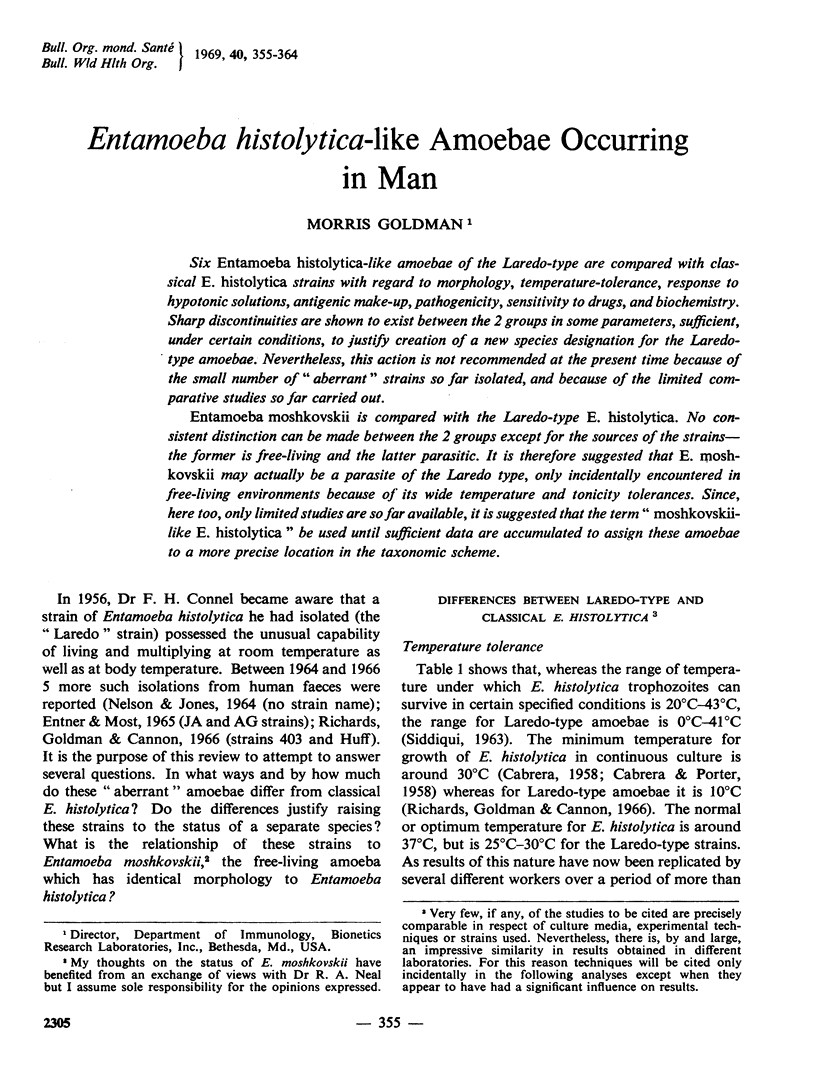
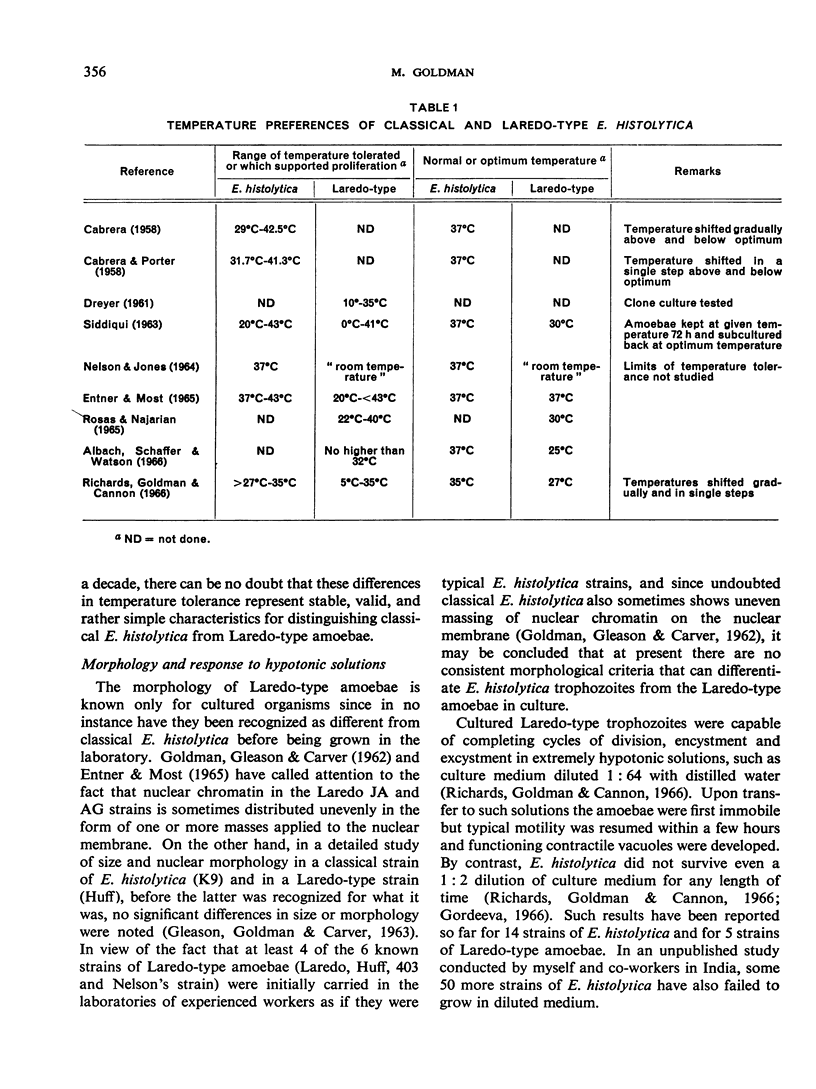
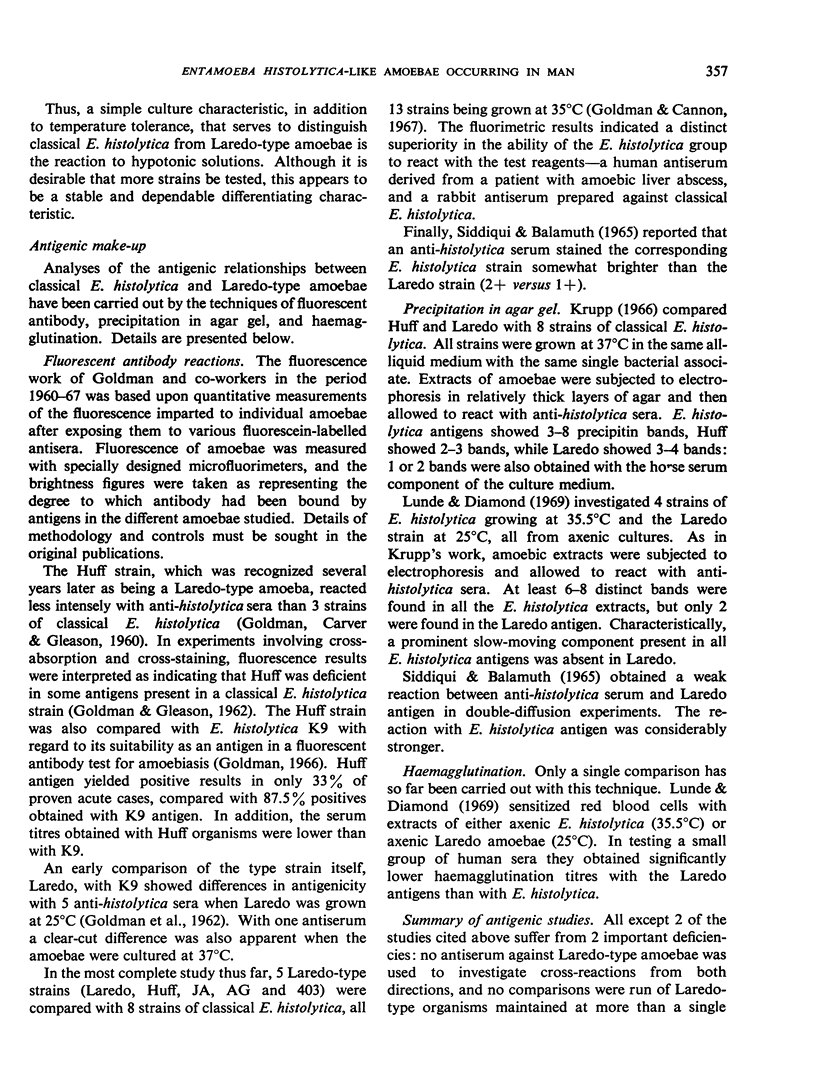
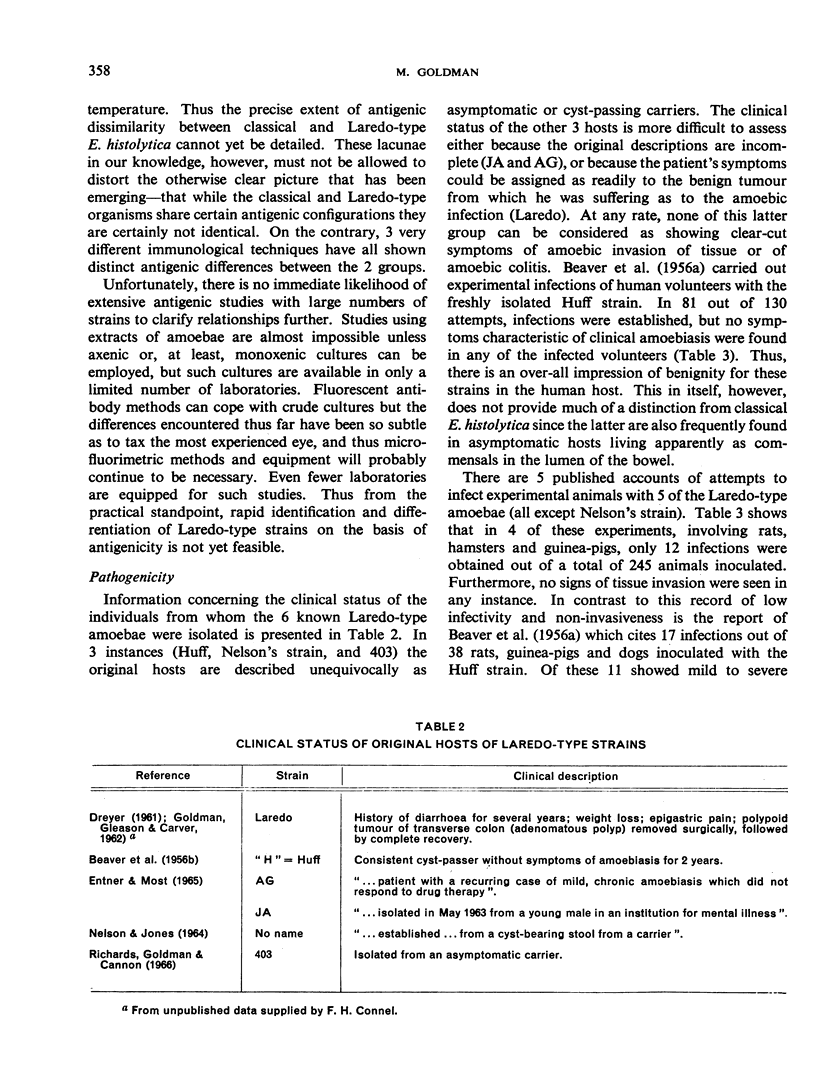
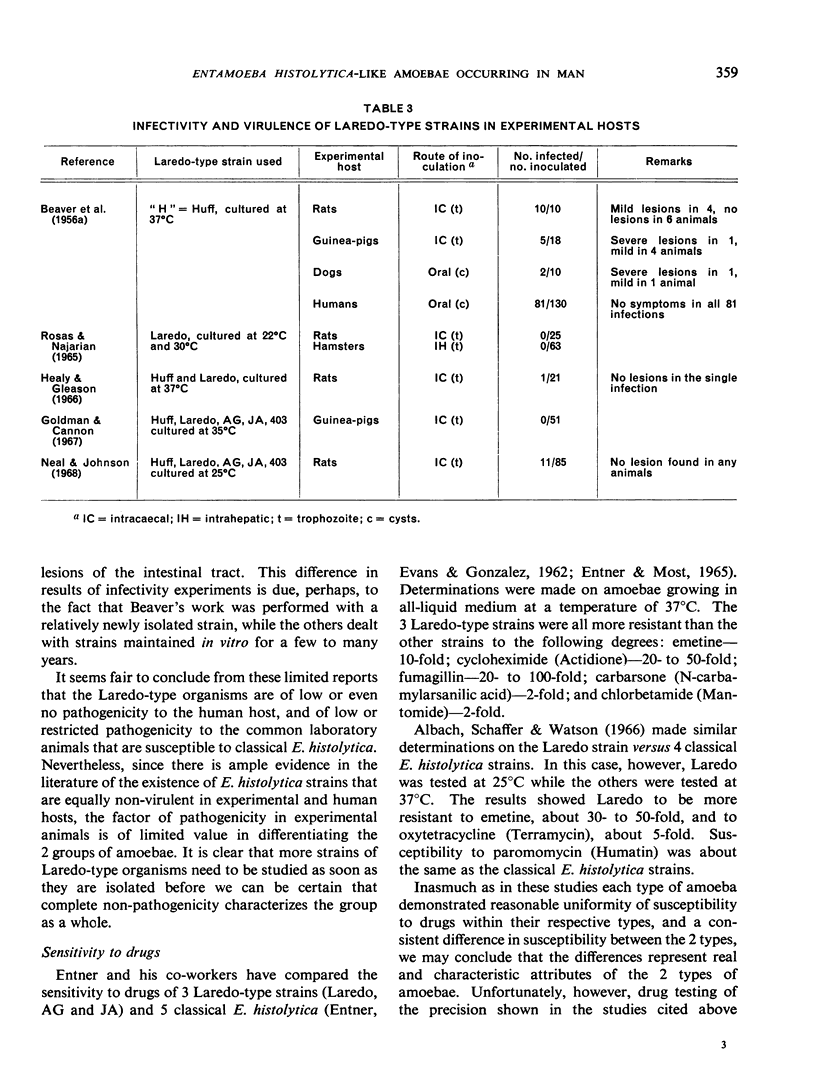
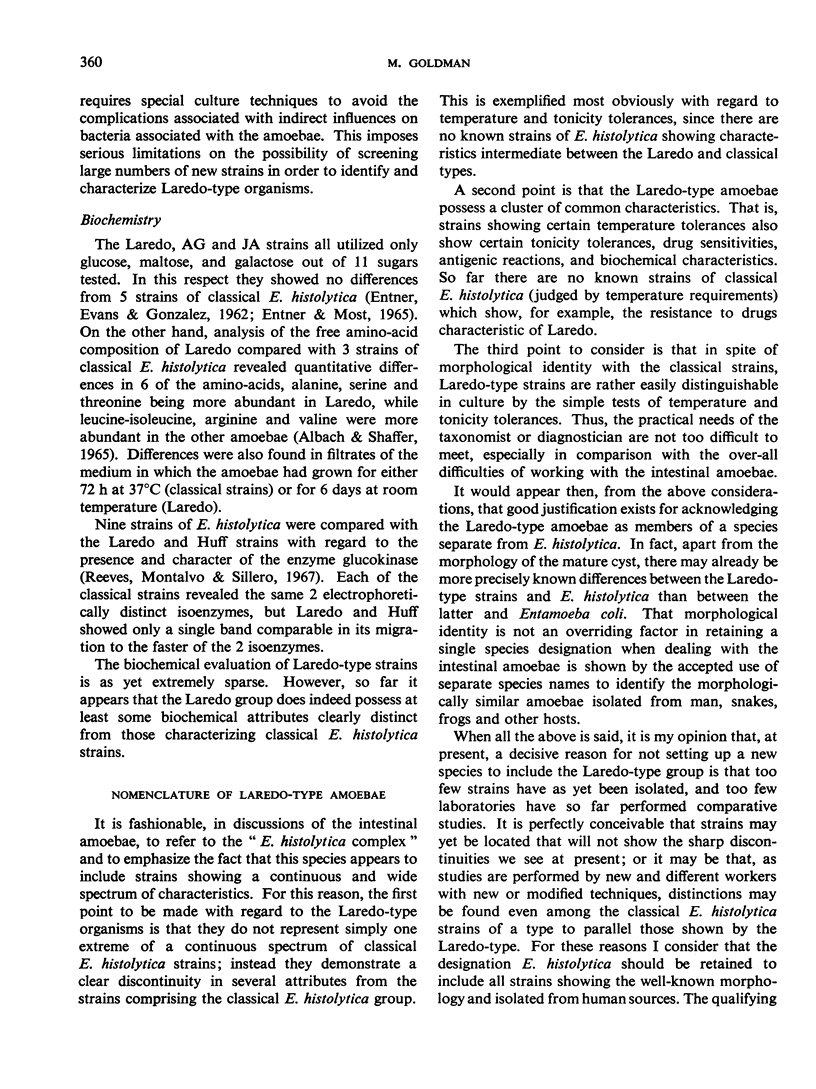
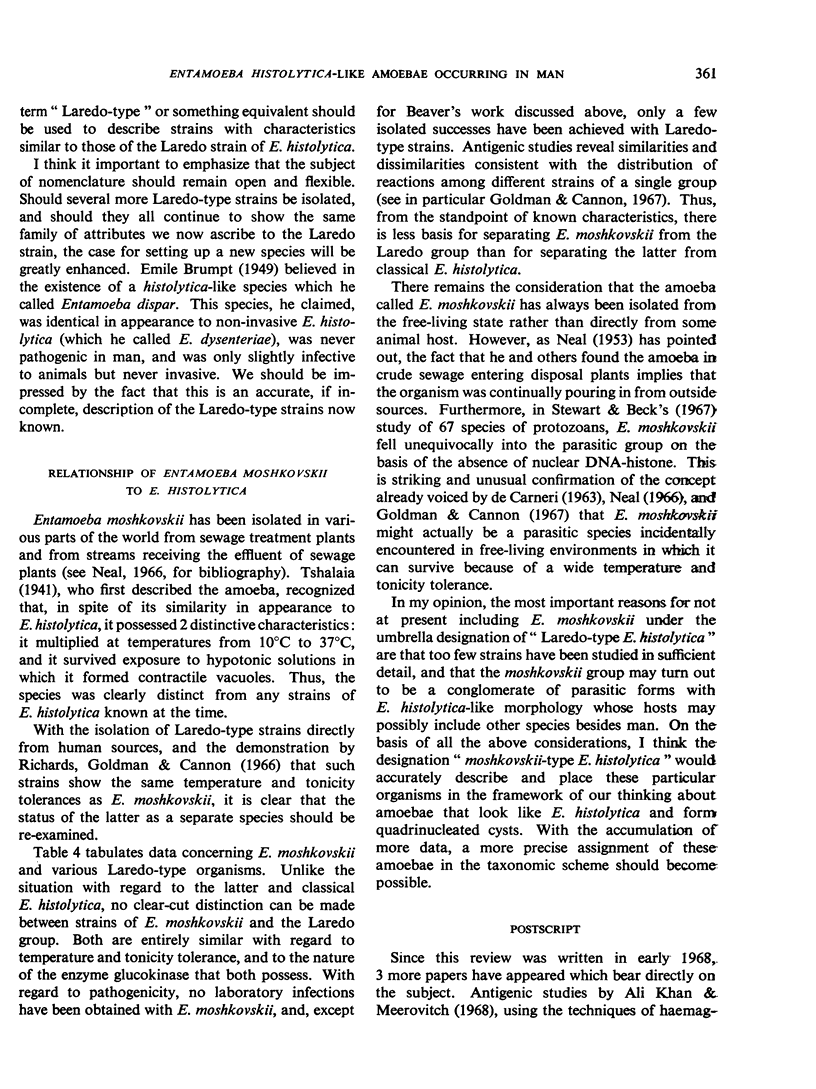
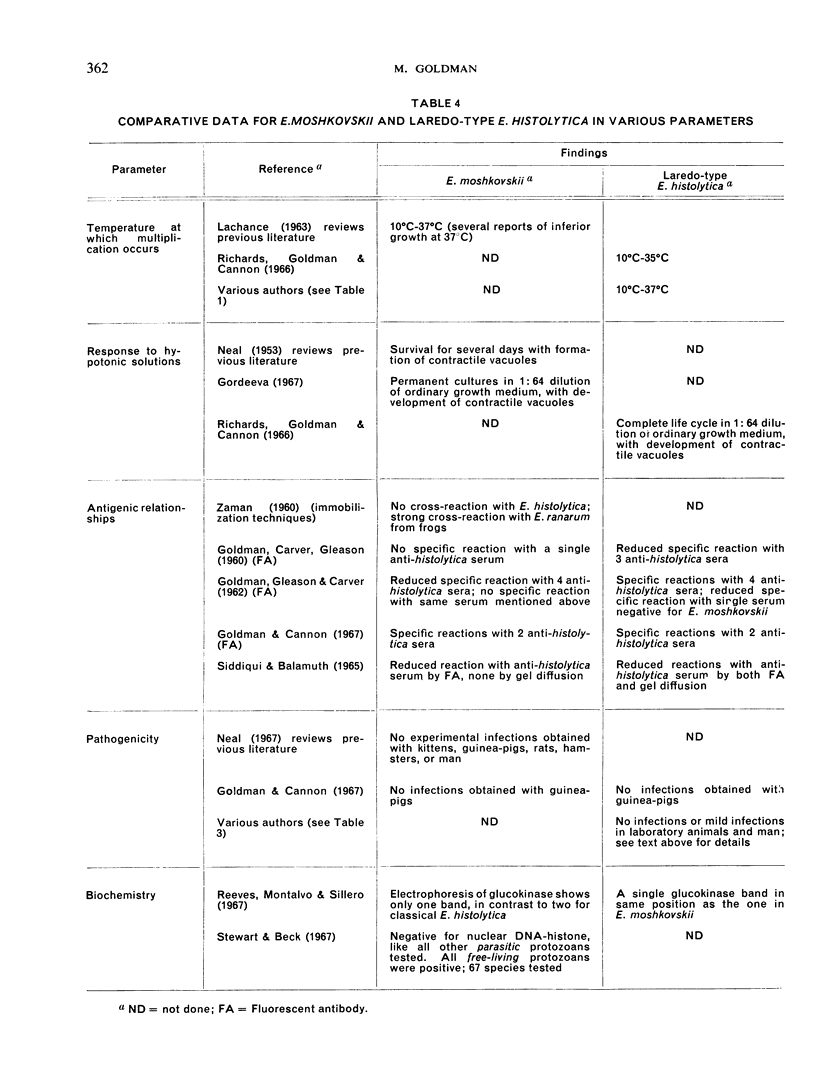
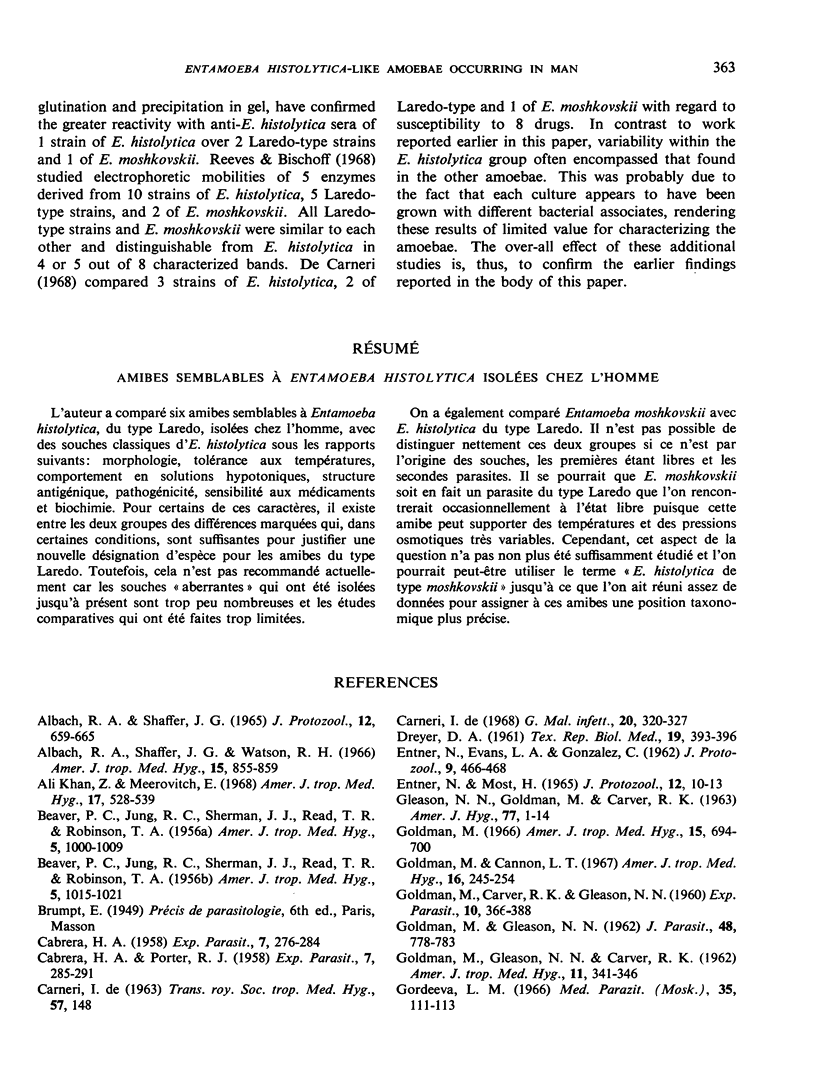
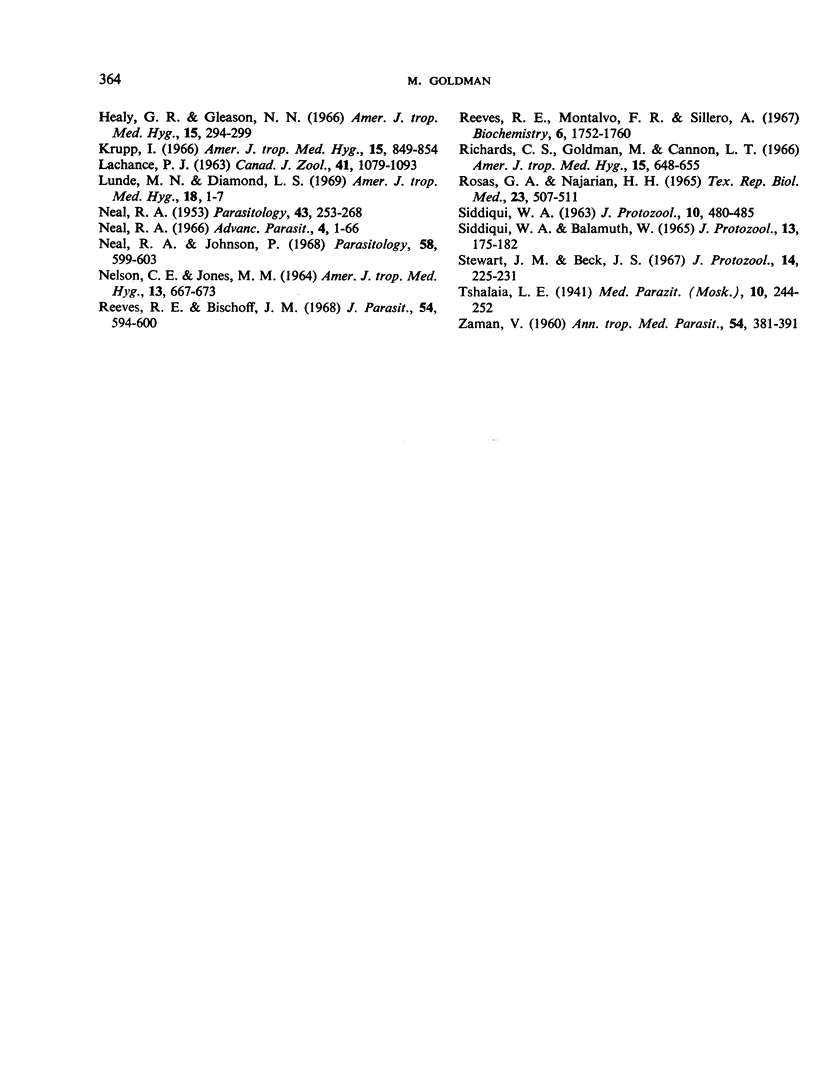
Selected References
These references are in PubMed. This may not be the complete list of references from this article.
- Albach R. A., Shaffer J. G. Free amino acid analyses of 4 strains of Entamoeba histolytica and of E. invadens in the CLG medium. J Protozool. 1965 Nov;12(4):659–665. doi: 10.1111/j.1550-7408.1965.tb03269.x. [DOI] [PubMed] [Google Scholar]
- Albach R. A., Shaffer J. G., Watson R. H. A comparison of in vitro drug sensitivities of strains of entamoeba which grow at 37 degrees C and at room temperature. Am J Trop Med Hyg. 1966 Nov;15(6):855–859. doi: 10.4269/ajtmh.1966.15.855. [DOI] [PubMed] [Google Scholar]
- BEAVER P. C., JUNG R. C., READ T. R., ROBINSON T. A., SHERMAN H. J. Experimental Entamoeba histolytica infections in man. Am J Trop Med Hyg. 1956 Nov;5(6):1000–1009. doi: 10.4269/ajtmh.1956.5.1000. [DOI] [PubMed] [Google Scholar]
- BEAVER P. C., JUNG R. C., READ T. R., ROBINSON T. A., SHERMAN H. J. Experimental chemoprophylaxis of amebiasis. Am J Trop Med Hyg. 1956 Nov;5(6):1015–1021. [PubMed] [Google Scholar]
- CABRERA H. A., PORTER R. J. Survival time and critical temperatures of various strains of Entamoeba histolytica. Exp Parasitol. 1958 May;7(3):285–291. doi: 10.1016/0014-4894(58)90025-0. [DOI] [PubMed] [Google Scholar]
- CABRERA H. A. Temperature adaptation of Entamoeba histolytica and its effect on virulence. Exp Parasitol. 1958 May;7(3):276–284. doi: 10.1016/0014-4894(58)90024-9. [DOI] [PubMed] [Google Scholar]
- DREYER D. A. Growth of a strain of entamoeba histolytica at room temperature. Tex Rep Biol Med. 1961;19:393–396. [PubMed] [Google Scholar]
- De Carneri I. Studio delle relazioni tra Entamoeba histolytica, ceppi Laredo, Entamoeba invadens ed Entamoeba moshkovskii valulate in base alla sensibilità ai farmaci antiamebici. G Mal Infett Parassit. 1968 Mar;20(3):320–327. [PubMed] [Google Scholar]
- ENTNER N., MOST H. GENETICS OF ENTAMOEBA: CHARACTERIZATION OF TWO NEW PARASITIC STRAINS WHICH GROW AT ROOM TEMPERATURE (AND AT 37 DEGREES C). J Protozool. 1965 Feb;12:10–13. doi: 10.1111/j.1550-7408.1965.tb01805.x. [DOI] [PubMed] [Google Scholar]
- GLEASON N. N., GOLDMAN M., CARVER R. K. Size and nuclear morphology of Entamoeba histolytica and Entamoeba hartmanni trophozoites in cultures and in man. Am J Hyg. 1963 Jan;77:1–14. doi: 10.1093/oxfordjournals.aje.a120287. [DOI] [PubMed] [Google Scholar]
- GOLDMAN M., GLEASON N. N. Antigenic analysis of Entamoeba histolytica by means of fluorescent antibody. IV. Relationships of two strains of E. histolytica and one of E. Hartmanni demonstrated by cross-absorption techniques. J Parasitol. 1962 Oct;48:778–783. [PubMed] [Google Scholar]
- GOLDMAN M., GLEASON N. N., CARVER R. K. Antigenic analysis of Entamoeba histolytica by means of fluorescent antibody. III. Reactions of the Laredo strain with five anti-histolytica sera. Am J Trop Med Hyg. 1962 May;11:341–346. doi: 10.4269/ajtmh.1962.11.341. [DOI] [PubMed] [Google Scholar]
- Goldman M., Cannon L. T. Antigenic analysis of entamoeba histolytica by means of fluorescent antibody. V. Comparison of 15 strains of entamoeba with information on their pathogenicity to guinea pigs. Am J Trop Med Hyg. 1967 May;16(3):245–254. doi: 10.4269/ajtmh.1967.16.245. [DOI] [PubMed] [Google Scholar]
- Goldman M. Evaluation of a fluorescent antibody test for amebiasis using two widely differing ameba strains as antigen. Am J Trop Med Hyg. 1966 Sep;15(5):694–700. doi: 10.4269/ajtmh.1966.15.694. [DOI] [PubMed] [Google Scholar]
- Gordeeva L. M. K voprosu o kul'tivirovanii éntameb na gipotonicheskoi srede. Med Parazitol (Mosk) 1966 Jan-Feb;35(1):111–113. [PubMed] [Google Scholar]
- Healy G. R., Gleason N. N. Studies on the pathogenicity of various strains of Entamoeba histolytica after prolonged cultivation, with observations on strain differences in the rats employed. Am J Trop Med Hyg. 1966 May;15(3):294–299. doi: 10.4269/ajtmh.1966.15.294. [DOI] [PubMed] [Google Scholar]
- Khan Z. A., Meerovitch E. A comparative study of the antigens of some of the 'histolytica-type" strains of Entamoeba. A qualitative and quantitative evaluation of antigens by indirect hemagglutination, gel-precipitation, and immunoelectrophoresis. Am J Trop Med Hyg. 1968 Jul;17(4):528–539. doi: 10.4269/ajtmh.1968.17.528. [DOI] [PubMed] [Google Scholar]
- Krupp I. M. Immunoelectrophoretic analysis of several strains of Entamoeba histolytica. Am J Trop Med Hyg. 1966 Nov;15(6):849–854. doi: 10.4269/ajtmh.1966.15.849. [DOI] [PubMed] [Google Scholar]
- Lunde M. N., Diamond L. S. Studies on antigens from axenically cultivated Entamoeba histolytica and Entamoeba histolytica-like amebae. Am J Trop Med Hyg. 1969 Jan;18(1):1–6. [PubMed] [Google Scholar]
- NEAL R. A. Studies on the morphology and biology of Entamoeba moshkovskii Tshalaia, 1941. Parasitology. 1953 Nov;43(3-4):253–268. doi: 10.1017/s003118200001862x. [DOI] [PubMed] [Google Scholar]
- NELSON E. C., JONES M. M. CULTIVATION OF ENTAMOEBA HISTOLYTICA IN CARBON DIOXIDE-BICARBONATE BUFFER SYSTEM MEDIA. Am J Trop Med Hyg. 1964 Sep;13:667–673. doi: 10.4269/ajtmh.1964.13.667. [DOI] [PubMed] [Google Scholar]
- Neal R. A., Johnson P. The virulence to rats of five Entamoeba histolytica-like strains capable of growth at 25 degrees C and attempts to discover simular strains. Parasitology. 1968 Aug;58(3):599–603. doi: 10.1017/s0031182000028894. [DOI] [PubMed] [Google Scholar]
- ROSAS G. A., NAJARIAN H. H. INFECTIVITY STUDIES ON THE LAREDO STRAIN OF ENTAMOEBA HISTOLYTICA. Tex Rep Biol Med. 1965;23:507–511. [PubMed] [Google Scholar]
- Reeves R. E., Bischoff J. M. Classification of Entamoeba species by means of electrophoretic properties of amebal enzymes. J Parasitol. 1968 Jun;54(3):594–600. [PubMed] [Google Scholar]
- Reeves R. E., Montalvo F., Sillero A. Glucokinase from Entamoeba histolytica and related organisms. Biochemistry. 1967 Jun;6(6):1752–1760. doi: 10.1021/bi00858a025. [DOI] [PubMed] [Google Scholar]
- Richards C. S., Goldman M., Cannon L. T. Cultivation of Entamoeba histolytica and Entamoeba histolytica-like strains at reduced temperature and behavior of the amebae in diluted media. Am J Trop Med Hyg. 1966 Jul;15(4):648–655. doi: 10.4269/ajtmh.1966.15.648. [DOI] [PubMed] [Google Scholar]
- SIDDIQUI W. A. COMPARATIVE STUDIES OF EFFECT OF TEMPERATURE ON THREE SPECIES OF ENTAMOEBA. J Protozool. 1963 Nov;10:480–485. doi: 10.1111/j.1550-7408.1963.tb01710.x. [DOI] [PubMed] [Google Scholar]
- Siddiqui W. A., Balamuth W. Serological comparison of selected parasitic and free-living amoebae in vitro, using diffusion-precipitation and fluorescent-antibody technics. J Protozool. 1966 Feb;13(1):175–182. doi: 10.1111/j.1550-7408.1966.tb01889.x. [DOI] [PubMed] [Google Scholar]
- Stewart J. M., Beck J. S. Distribution of the DNA and the DNA-histone antigens in the nuclei of free-living and parasitic Sarcomastigophora. J Protozool. 1967 May;14(2):225–231. doi: 10.1111/j.1550-7408.1967.tb01988.x. [DOI] [PubMed] [Google Scholar]
- ZAMAN V. Studies with the immobilization reaction in the genus Entamoeba. Ann Trop Med Parasitol. 1960 Dec;54:381–391. doi: 10.1080/00034983.1960.11686001. [DOI] [PubMed] [Google Scholar]


